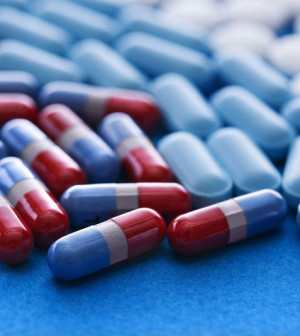- Could Your Grocery Store Meat Be Causing Recurring UTIs?
- Are You Making This Expensive Thermostat Error This Winter?
- Recognizing the Signs of Hypothyroidism
- 10 Strategies to Overcome Insomnia
- Could Artificial Sweeteners Be Aging the Brain Faster?
- Techniques for Soothing Your Nervous System
- Does the Water in Your House Smell Funny? Here’s Why
- Can a Daily Dose of Apple Cider Vinegar Actually Aid Weight Loss?
- 6 Health Beverages That Can Actually Spike Your Blood Sugar
- Treatment Options for Social Anxiety Disorder
FDA OKs New Injectable Type 2 Diabetes Medication

The injectable drug Adlyxin (lixisenatide) has been approved to treat adults with type 2 diabetes, the U.S. Food and Drug Administration says.
The once-daily injection is to be used along with diet and exercise to improve patients’ blood sugar levels.
The FDA reviewed 10 clinical trials on the safety and effectiveness of Adlyxin. These studies included 5,400 people with type 2 diabetes. The drug was also specifically tested for heart issues in an additional 6,000 people at risk of heart disease, the FDA said Thursday in a news release.
The FDA concluded that Adlyxin helps normalize blood sugar levels. And it doesn’t appear to increase the risk of heart problems.
Adlyxin is in a class of drugs called glucagon-like peptide-1 (GLP-1) receptor agonists. Other GLP-1 drugs include liraglutide (Victoza), exenatide (Byetta, Bydureon) and dulaglutide (Trulicity), according to the American Diabetes Association.
Adlyxin shouldn’t be used to treat people with type 1 diabetes. It also shouldn’t be used by anyone with increased ketones (a sign that the body isn’t getting enough insulin) in their blood or urine, or extremely elevated ketones (diabetic ketoacidosis), the FDA said.
Common side effects of Adlyxin included nausea, vomiting, headache, diarrhea and dizziness, the findings showed. Low blood sugar (hypoglycemia) occurred in patients who took both Adlyxin and other diabetes drugs such as sulfonylureas and/or a long-acting (basal) insulin, the agency said.
Some people who took Adlyxin had severe hypersensitivity reactions, including serious allergic reactions (anaphylaxis), the agency said.
The FDA said it’s requiring drug maker Sanofi-Aventis to conduct post-marketing studies of Adlyxin.
More than 29 million Americans have type 2 diabetes, the FDA noted. In the United States, type 2 diabetes accounts for over 90 percent of diabetes cases, the agency said. If left untreated, persistent high blood sugar levels can increase the risk of serious complications, such as heart disease, blindness, and nerve and kidney damage.
More information
The American Diabetes Association has more about type 2 diabetes.
Source: HealthDay
Copyright © 2026 HealthDay. All rights reserved.










